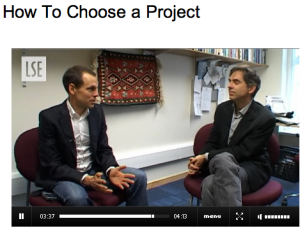Now that the marks have been tallied and the hands shaken at graduation, here is the remainder of the list, continued from here.
6. Capstone no.3 : Browse the website for videos such as the following:
Then HAVE FUN! It’s just school, where mistakes will cost you your mark, but not your job. Use this to learn, both about group dynamics and yourself. (NB: Taking it too seriously will result in a panic attack by November.)
-Your group: My uncle told me this when dealing with family. It seems pertinent here:
Before you open your mouth to speak, ask yourself if you’re saying something to advance yourself or if what you’re saying will better your relationship.
Will it help your group if you say this or will it just help you?
-Your client: Speak face-to-face as much as possible. It’s a rare chance to glimpse the inside of an organisation. Brainstorming ideas and discussing issues with them will help you figure out exactly what they want, and it makes it more interesting.
7. Dissertation, no. 1: Weekly meetings … with my advisor were refreshing draughts of cool, sane waters in the midst of hot Capstone insanity. Showing someone what you’ve worked on all week for your dissertation will force you to keep up a good pace. My advisor was amazing, and she knew nothing about my topic — but mostly likely, neither did any of the markers. If you don’t click with your advisor, go to someone else.
8. Dissertation, no.2: Quantitative is better than qualitative. We were all told that you do not need to do a quantitative dissertation to do well. But when the professors gave examples of qualitative work they liked, it felt like the exceptions that proved the rule. The people marking your dissertations are economists and game theorists — their language is numbers and diagrams. Speak to them in their language.
9. Dissertation, no.3: abstract (worth 10% of the final mark). From what I received and heard from friends, the main critiques were:
- Where is the data?
- This is good for a doctorate but too much for a masters.
- What is your question? (Your title should be a precise question — one, simple question.)
Find a topic you love. Find an academic theory. Find the data to test/expand/refute that theory. Have it in your hands before your abstract is due, and KISS, as my old history teacher used to say (Keep It Simple, Stupid!).
For your topic/question: As a doctoral student told me, when you’re a brilliant professor on the verge of retirement, you can write books and give lectures on topics like, “China” or “The Arabs.” When you’re a lowly graduate student, you write on, “Basket Weaving in the First Two Years of the Byzantine Empire.” Stay focused.
(NB: Don’t worry if you get a C for the abstract, as many did this year, you can still end up with a distinction.)
10. Referencing:
http://www.mendeley.com/ is free and allows you to upload JSTOR and other PDFs and culls the relevant bibliographic data from them automatically. I had some issues with the Desktop version, which does not allow you to add as many details as it does online, but it’s an invaluable resource nonetheless. Endnote is also a classic. Zotero is online and free as well.
11. Suggested options: If you can, take Leslie Hannah’s MN425 Business in the Global Environment. If you’re in his discussion section, you will learn something interesting every time, often through his off the cuff remarks. It’s thoroughly enjoyable, he cares about his students, and there is . . . no exam. Just two papers (2,000 words each).
Also, you may not believe me, but AC470 Accounting in the Global Economy was as fascinating as the topic could be. Half the lectures were covered by an accountant, the other half by a sociologist looking at how people form what we’d think were just straightforward rules and standards (overall lesson: even accounting is subjective). The professors cared about what they were teaching and were always open for advice.
One last thing: look at how LSE calculates honours. For the Americans: your overall GPA does not matter! If you get a distinction in 6 units, fail a class and almost fail all your other classes, you will graduate with distinction. If you get a distinction in 3 units and a high merit — even a 69 — in everything else, you graduate with just a merit. Think about it.







